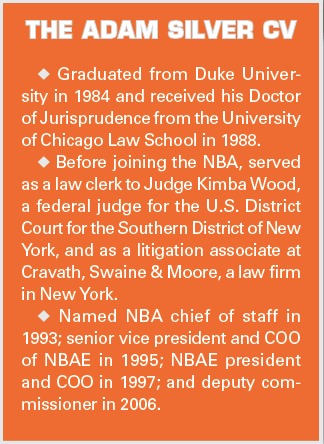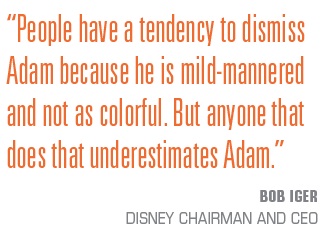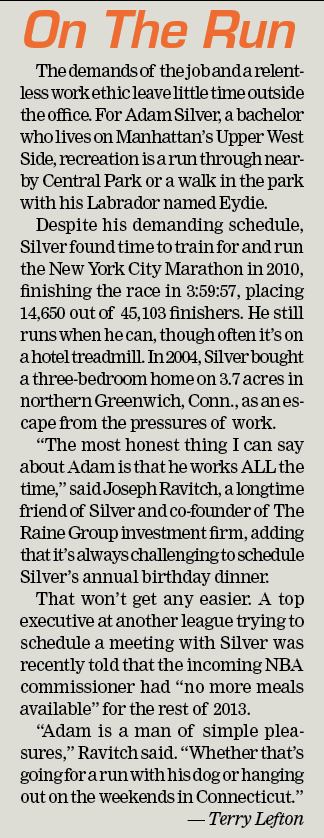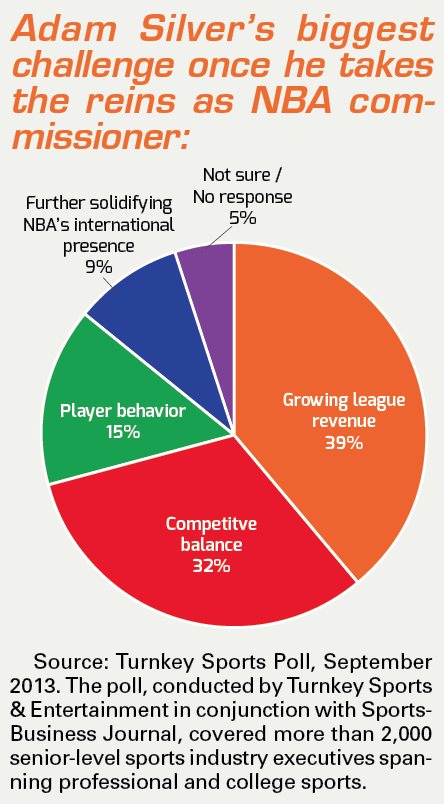Editor's note: This story is revised from the print edition.
After 20 years toiling at the elbow of NBA Commissioner David Stern, Adam Silver needed only minutes last spring to show that he’s ready to run the league.
Silver listened as debate raged between NBA owners, a phalanx of lawyers and Stern; the point of contention was whether ownership would allow the Sacramento Kings to be sold to a group that would move the team more than 625 miles north to Seattle. In the balance was an astounding franchise price of $406 million, along with a relocation
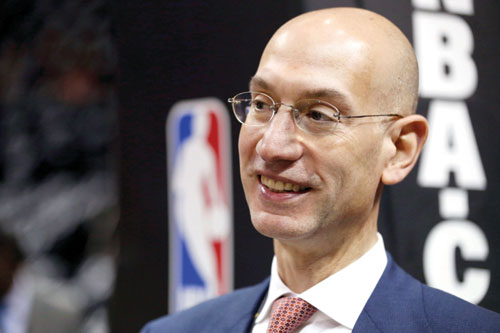 |
When Adam Silver takes over as NBA commissioner in February, insiders expect a seamless transfer of power.
Photo by: USA Today Sports |
fee rumored to be around $75 million, which would be split among ownership.
None of that mattered to Silver as he surgically cut through the posturing, pushing to keep the Kings in California and sending a message to owners and the fans about the importance of franchise stability.
“Adam was very blunt and it changed the conversation in the room,” Washington Wizards owner Ted Leonsis said. “The lawyers spoke and David spoke, but Adam found a higher calling that all of us tapped into.”
It was vintage Silver; a performance displaying the skills learned working under Stern. Skills learned, too, by growing up the son of one of New York City’s most prominent lawyers, a low-key approach that dates to law school. Sit. Listen. Then act.
While Stern remains in charge until he retires Feb. 1, after 30 years as commissioner, insiders know the transfer of power will be seamless. It’s a succession honed by 20 years of Stern grooming Silver to take his job.
Distinctly different
Stern and Silver have distinct personalities. Each man is described by friends and businesses colleagues as the proverbial smartest man in the room. Stern, arguably the most accomplished commissioner in sports history, can be autocratic, and sometimes irascible. Silver’s wit is legendary and if he has an ego, no one has seen it.
Yet in terms of intellect, perspective and vision, Silver and Stern are so analogous that the longtime commissioner
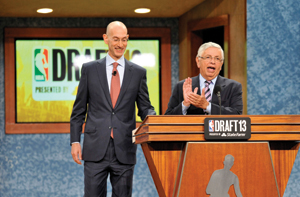 |
NBA Commissioner David Stern introduces Adam Silver at this year’s draft.
Photo by: USA Today Sports |
years ago empowered Silver to speak for him — a mantle of distinction rarely achieved at the NBA.
“Ninety percent of the day-to-day dealings between the NBA and ESPN at the highest level happen between me and Adam,” said ESPN President John Skipper. “He never says he has to go check. That’s a tribute to how closely aligned they are.”
While Silver’s vision for the NBA mirrors that of his boss, the difference between Stern and Silver is their personalities.
“David is big, dynamic, unbelievably smart, quick,” Skipper said. “You make a misstep on a stat or a fact or a recollection with David and, man, he is on it. He can be quite intimidating. Adam is intellectually intimidating.”
Silver brings an even-tempered, consenus-building approach. He’s known for a keen business sense, an ability to quickly distill issues and make decisions.
Disney Chairman and CEO Bob Iger concurred that while the style of the two men at the top of the NBA is different, their substance is analogous.
“David is more larger than life than Adam is ever going to be,” said Iger, who has known Silver for 20 years. “It’s just a completely different shtick. They both bring great strengths to the table. People have a tendency to dismiss Adam because he is mild-mannered and not as colorful. But anyone that does that underestimates Adam.”
Added NBC Sports Group Chairman Mark Lazarus, “There is certainly a difference in their volume [level]. But while their volume may be different, the starkness and import of what they are saying is always the same.’’
Or as Tim Leiweke, CEO of Toronto Raptors parent Maple Leaf Sports & Entertainment put it, “Adam will tell you to go to hell and you will look forward to the trip.”
Path to the top
Silver’s path to the NBA began in Rye, N.Y., about 30 miles from the NBA’s headquarters above Fifth Avenue, which overlooks St. Patrick’s Cathedral in midtown Manhattan.
Silver is one of five children, with two brothers and two sisters. It is a family of diverse careers. Erik Silver is director of tennis at a resort in Boca Raton, Fla.; Ann Silver runs her own company helping nonprofits with sustainability in Nevada; Owen Silver is an entrepreneur in Boulder, Colo.; and Emily Geier is a homemaker in Ohio.
Silver attended Rye High School and received his undergraduate degree from Duke University in 1984. He worked
as a legislative aide for congressman Les AuCoin on Capitol Hill from 1984-85 and then went on to earn his law degree in 1988 from the University of Chicago. He was a low-key, but active law student, volunteering at the school’s legal assistance clinic where he learned the profession alongside practicing attorneys.
Then, as now, Silver was self-effacing, focusing on results over recognition.
“Adam is the opposite of an egotist; he’s ego-less,’’ said Bill Daugherty, former NBA senior vice president of business development, who was at the league from 1991-99.
Silver turned down requests to be interviewed for this story, a practice that the publicity-shy deputy commissioner has ordered “hundreds of times” previously in response to media requests, according to a former NBA public relations official.
“He’s all about getting the job done,” said law school classmate Michael Alter, who now owns the WNBA’s Chicago Sky. “We had a lot of guys [in law school] who needed to let everyone know how smart they are, and Adam definitely wasn’t one of those.”
Silver’s roots at the University of Chicago’s Hyde Park Chicago campus run deep. He sits on the law school’s visiting committee and chairs its annual giving program.
“He is extraordinarily well-liked by his class and alumni,” said Michael Schill, dean of the University of Chicago Law School. “Adam harkens back to the age when lawyers did things beyond law.”
The NBA was not on Silver’s radar when he graduated from law school and moved to New York City to clerk for U.S. District Judge Kimba Wood in the Southern District of New York.
Joseph Ravitch, co-founder of The Raine Group, a boutique investment firm focused on media and entertainment, knew Silver as a family friend growing up and got to know him as a personal friend when they were both clerking for judges in the Southern District.
“Adam hasn’t changed,” said Ravitch. “He treats my sons with the same respect he treats his owners. That quality is absent in so many people, particularly at the mogul level that he operates in.”
Father-son legal bond
Silver’s work as a clerk put him on track to follow his father’s legal career. Ed Silver was a lawyer’s lawyer; a labor attorney also recognized for his personal grace. He chaired the Proskauer Rose law firm from 1981 to 1991 and was special counsel to New York City under Mayors John Lindsay, Abraham Beame, Ed Koch and David Dinkins — a span of 27 years. The elder Silver worked at Proskauer with a promising attorney in Stern, for whom he became a mentor.
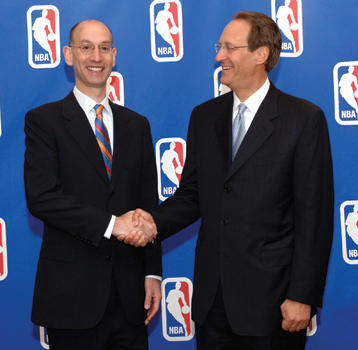 |
Silver shakes hands with Russ Granik in 2006 after the NBA Board of Governors appointed Silver to be Granik’s successor as deputy commissioner.
Photo by: NBAE / Getty Images |
Following his one-year stint as Wood’s law clerk, Adam Silver moved into private practice as an associate with white-shoe law firm Cravath, Swaine & Moore beginning in 1989. The job apparently couldn’t hold his interest and, by 1992, Silver was considering becoming an assistant U.S. attorney. That’s when he asked Stern for a meeting and some career advice.
Stern gave Silver a spiel about the sports industry and later decided to offer him a job as his special assistant.
“I was happy to take him on as a special assistant … so the exploitation began,” Stern joked. “He is inordinately smart and hardworking. He has an easy manner and likes to learn. You can’t do better than that.”
Silver fit Stern’s executive prototype. Other top league executives, such as Gary Bettman, who would later become NHL commissioner, and Russ Granik, who became NBA deputy commissioner, both worked at big law firms before joining the NBA. However, Granik and Bettman began in the NBA’s legal department; as a special assistant, Silver took on a generalist’s role.
“From the beginning, it was apparent Adam was going to be a commissioner,” said Daugherty, citing Sliver’s leadership on projects such as the NBA’s 50th anniversary in 1996, and the connections that put the league at the nexus of sports of entertainment. “And from the beginning, his instincts have been dead on. He could always make things happen and make them happen smoothly.”
Labor intensive
Silver quickly proved he could match Stern in stamina, as both worked brutal hours.
“He shares with David … a willingness to work very hard,” Granik said. “Sometimes people discount that and look at style or personality. Adam was always available. I hate the phrase 24/7, but Adam always understood that.”
To a league with an acronym often jokingly referred to as standing for “Nothing But Attorneys,” Silver brought a business-first style that front-line executives appreciated.
“[Silver] got really good at forgetting about legal ramifications,” said Tom O’Grady, a former creative director at the NBA who worked at the league from 1990-2003 and now runs his own Gameplan Creative agency. “He would tell us to do what is best for the business and then he’d go back and deal with the legal issues.”
Known as a quick study, Silver learned from sports’ most experienced commissioner in Stern the attributes that served him well as he progressed through the league office.
“The three areas of expertise required for any commissioner are labor relations, media distribution and negotiations, along with marketing and branding,” said former NBAE President David Schreff, who now heads consultancy Bedare Sports and Entertainment. “Adam mastered each of those early on and learned from the master himself. It was a 20-year apprenticeship.”
Along with an ability to quickly process and synthesize information, Silver’s vision was immediately apparent.
“Adam understood how all the synapses in the NBA were connected right away,” said former NBAE President Gary Stevenson, now president and managing director of MLS Business Ventures. “At a very early age, Adam had a long-term view of the business. He has always had a very good understanding of both the value of NBA content and where that content would eventually be distributed some day. He has always been ahead of the games, domestically and internationally, because of that.”
New media savvy
Under Stern’s command, Silver helped start NBA.com in 1995, making the NBA the first league to integrate team and league websites into a single network. By 1999, Silver helped engineer the launch of NBA TV (originally NBA.com TV) the first league-owned cable network.
“We didn’t know what we were getting into when we started it,” O’Grady said. “NBA TV was a big deal and NBA.com was sputtering when it first came out. … But Adam understood the cumulative power of it all.”
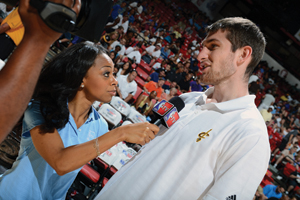 |
Silver guided the launch of NBA TV, the first league-owned cable network.
Photo by: NBAE / Getty Images |
Don Sperling, former NBAE senior vice president and executive producer, recalls being impressed on Silver’s first visit to the NBAE studios, when Silver began making inquiries about TV production, questions that seemed unlikely coming from someone trained as an attorney.
“Adam could always see way down the line,” said Sperling, now vice president and executive producer of Giants Entertainment, the media, programming and production arm of the New York Giants. “There was a lot of debate in the late ’90s about the future and media convergence. He really had vision on that.”
Silver also dovetailed with the incumbent; not a trivial matter at the NBA. “He understood David from the beginning,” said Shawn Bryant, former special assistant at the NBA.
Silver was named chief of staff in 1993; senior vice president and COO of NBAE in 1995; NBAE president and COO in 1997; and deputy commissioner in 2006.
“Adam had the right combination of talent and intellect to be successful, but with David, that just gets you to first base,” said Rick Welts, Golden State Warriors president and COO, and former league CMO. “Everything David Stern was involved with, Adam was involved with. [Silver] was smart enough to not talk when he was learning about something and became a real trusted alter ego for Stern.”
Silver became known for his technology expertise with an eye for the entertainment side of the business.
Among his biggest deals was negotiating with Stern in 2007 the league’s current $7.5 billion television deal with Turner, ABC and ESPN. That deal expires after the 2015-16 season and both sides already are talking about a new agreement with a rights fee that is expected to dwarf the existing contract.
“Adam understands the digital business better than anyone,” said Turner President David Levy. “A great negotiated deal is one where you never have to pull out the contract, and Adam and I have never pulled out the contract.”
A new generation
As a new generation of ownership emerged, Silver became a confidant to industrialists who made their fortunes in
technology such as Leonsis, Mark Cuban and Robert Pera.
“There is a new group of younger owners and Adam has really reached out to all of us,” said Leonsis, who has owned the Washington Wizards since 2010.
“Adam has complete buy-in from ownership across the league,” Welts said. “That’s something he’s earned and you can’t underestimate the importance of that.”
Comparisons of Stern and Silver are inevitable. No one expects the NBA’s business course to change much after January. Both Stern and Silver have been focused on digital and global expansion for years. Business partners do expect a change in tenor, if not direction, under Silver’s leadership.
“David is a little more aggressive stylistically — a little quicker to get in the face, if necessary,” Skipper said. “I do believe our noses have touched — mine and David’s. I’m not sure my nose has ever touched Adam’s. I know where he stands just as clearly as I know where David stands. I don’t think there’s a significant difference in the outcome between Adam and David.”
Said Jerry Colangelo, former owner of the Phoenix Suns and the current chairman of USA Basketball: “[Silver] has the experience, intelligence, and work ethic to do it all, but he will do it with a different style.”
Building relationships
Friends say that along with a commanding intellect, Silver’s “really a guy you can have belly laughs with,” said broadcaster Ahmad Rashad, who has known Silver since his early days at NBAE. “And he’s as comfortable in his own skin as anyone I know.”
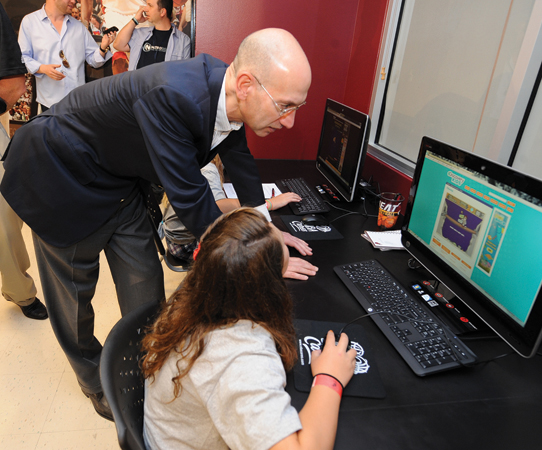 |
Colleagues say that despite his schedule, Silver is quick to make time for people. Here he attends the unveiling of an NBA Cares Learn and Play Center in Miami.
Photo by: NBAE / Getty Images |
But Silver can be tough as well. Those involved in labor issues saw a Silver displaying steely resolve during the six-month NBA lockout in 2011.
“We were facing the possibility of losing a season, but I never saw him sweat,” said Jeanie Buss, executive vice president of the Los Angeles Lakers and a member of the league’s labor committee. “You never saw him look like a guy in the movies who has been up for three days. He never showed any worse for the wear and that makes him such a leader.”
If Stern is known for tirelessly carrying the ball himself, Adam’s ability to coalesce effort from the best team members is also renowned.
“Adam is a great macro-manager,” Sperling said. “Anyone can micro-manage, but Adam will give you the freedom to be creative.”
For any senior executive, not to mention commissioner-in-training, Silver is widely lauded for his responsiveness and accessibility. Former NBA execs, along with players, friends and business associates, all laud him for personally returning emails and calls in hours, not days.
“As a business executive, he is the ultimate multiprocessor,” Schreff said.
Added Rashad, “I promise you, if the 12th guy on the Timberwolves calls him, Adam calls him back within a few hours.”
In a similar vein, Silver is celebrated for having time for just about anybody.
“Even as an intern, you could engage him and he always showed a genuine interest in what I was doing,” said Malcolm Turner, a managing director at Wasserman Media Group, who interned at the league in 1997.
“Like many people, he has just a few really close friends,” Ravitch said. “But everyone feels liked by him.”
NBA business partners commend Silver for a straightforward approach.
“Adam’s always honest, direct, and at least trying to understand my perspective, even if we don’t always agree,” said John Slusher, executive vice president of global sports marketing at Nike, an NBA licensee since 1992. “What we have in common is that he understands the power and value of promoting and protecting your brand. He has great relationships with players and can relate to them, which is not necessarily common for a senior executive in sports. Players respect him, but also feel at ease with him.”
Sue Bird, the longtime member of the WNBA’s Seattle Storm and a friend, said that she met Silver after she was drafted by the Storm in 2002. She interrupted — and subsequently shared — a meal in New York that Silver was having with former agent Leonard Armato.
“I was the dinner crasher and Adam was totally cool with it,” Bird said. “He’s the guy I’d call for a ride home or to talk about a career change.”
Second no more
Those who know Silver well advise that because of his longtime role assisting Stern, the incoming commissioner’s persona has not been widely revealed.
“Adam’s personality is very complementary to David and it has been for a long time,” said Sal LaRocca, NBA
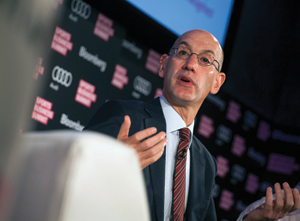 |
Silver will inherit a job that has grown more complex, but his peers say he is ready and the best person for the position.
Photo by: Bloomberg / Getty Images |
executive vice president of global merchandising.
“When you are No. 2, it’s really important to be respectful and understand who runs the place,” said Disney’s Iger, who worked under former Disney CEO Michael Eisner for a decade, before assuming the top spot. “The world doesn’t know Adam well yet, because he really hasn’t been given that opportunity.”
Or as Welts explained, “You always knew when David walked into a room, just by the force of his personality. Adam wins on substance and has a very different style. It will be interesting to see how he takes that style and creates his own brand of leadership.”
Stern was 42 when he became commissioner. Silver, who will be 51 when he takes command, often jokes about his 20-year apprenticeship. Stern has increased franchise values exponentially and took a drug-tainted league with its championship finals on tape-delayed national TV to the league with the most “globality,” to borrow one of his pet terms.
Consequently, the spotlight on Silver will be brighter. It’s a more complex job, now conducted in a global fishbowl.
“There are very few human beings that can walk into David’s shoes,” Leiweke said. “That is Adam’s hardest challenge, but he will be the best at it.”
It’s impossible to believe that anyone has been better prepared to assume the job of league commissioner.
“Anybody who works for David runs the gauntlet and either comes out the other side battered and discouraged or better for the process and a much better finished product,” said Welts, a fellow Stern protégé. “Adam is the latter.”
Staff writer John Ourand contributed to this report.




